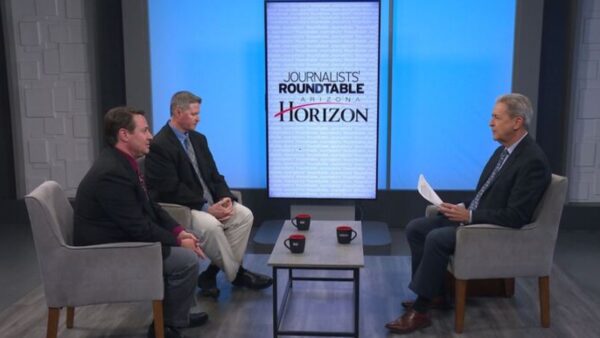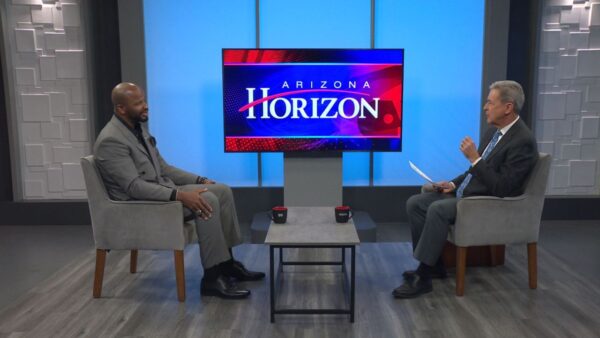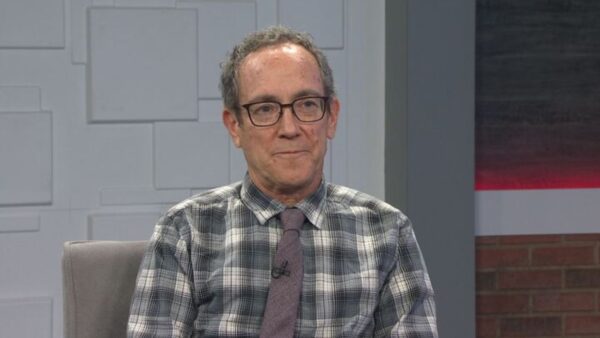Instead of storing photos, music and other information on their own computers, more and more people are storing it online in “the Cloud”. We’ll take a look at the evolution and future of cloud computing for individuals and businesses with Anthony D’Ambrosi of i/o, a Phoenix-based company that controls two of the largest data centers in the world.
Ted Simons: An increasing number of folks are moving information off of their home computers and storing it online in what has become known as "the cloud." Joining me to talk about what cloud computing means to individuals and businesses is Anthony D'Ambrosi of I-O, a Phoenix-based company that runs some of the world's largest data centers. Good to have you here.
Anthony D'Ambrosi: Great to be here.
Ted Simons: Again, define terms here. Cloud computing. Did I get it right? Instead of storing at home, I'm storing it somewhere?
Anthony D'Ambrosi: That's part of the basic definition of cloud. One of the jokes in the industry, if you ask 10 people you might get 11 different definitions but actually Cloud Computing is a new delivery mechanism where a user can consume information technology as a service and not have to worry about the complexities of hardware and software.
Ted Simons: An example would be kindle, correct?
Anthony D'Ambrosi: Kindle is a great example of a cloud-based service provided by Amazon for the most part where the kindle device lets the consumer consume what they want.
Ted Simons: What lends itself to cloud computing best and what should stay on local computers?
Anthony D'Ambrosi: That's a great question. In general, the initial applications for cloud computing were based on consumer and retail sector. Where you can consume applications as a retail user off the cloud. But more and more the cloud has penetrated the enterprise. The non-critical applications. One big example - Like sales force automation, Where early on there were a lot of cloud computing solutions to do customer relations management where you could consume intelligence with your sales force over the cloud.
Ted Simons: One of the benefits of the cloud, you can access information anywhere. You're a sales force, you are out there, all over the place and you don't have to be tethered to a P.C.?
Anthony D'Ambrosi: Very true. There's a nice mobility aspect consuming over the internet and over the cloud, whereby the user is not tied to a particular location or a particular device.
Ted Simons: What about security? Sometimes when I'm doing my stuff on the computer, man, this is a lot of personal information out there and I got to trust these folks, you guys or -- who are the cloud. I've got to trust that the security issues will be handled correctly.
Anthony D'Ambrosi: It's a valid concern that many users and enterprisers have, but frankly, in a lot of scenarios, the cloud is an opportunity to provide increased security. If you think about the security risk of mission critical information on a user's local device or a local hard drive, having security stored in an enterprise class data-center infrastructure much like we provide, with the right physical and logical physical controls make the security concerns over the data itself, less in the cloud than it would be on the users' computer.
Ted Simons: If I'm a user and not updating, I could be at risk, where if everything is on the cloud, you are updating.
Anthony D'Ambrosi: We're updating. We're making sure that the back-end infrastructure of the cloud is highly secured and only accessed in a way that's permissible.
Ted Simons: Do the cloud data centers share information at all?
Anthony D'Ambrosi: Depending on the nature of the business process or application you might be automated. Some environments do have a shared infrastructure for certain types of computing. Other environments are dedicated and customized for a given consumer.
Ted Simons: If there are privacy concerns, if -- we used kindle as an example. It knows what book I've read and how often I've read it. That information, I'm getting it from the cloud?
Anthony D'Ambrosi: That's correct, depending on what engagement or contractual relationship the user enters into with the cloud provider, there's a certain amount of customer data that's permissible and access to that data is used. Imagine a repository with Google -- user buying patterns, however, all controlled within the bounds of permission and security. While there's intelligence in the cloud, there are controls commercially and technologically to make sure it's protected.
Ted Simons: Is that an evolving legal issue as to what has to be protected?
Anthony D'Ambrosi: Very much so. The legal issues and the contractual issues around cloud computing continue to evolve. Especially if you talk about the cross border legal environments, the regulatory environments from certain governments on how data is stored and protected, they vary from country to country.
Ted Simons: Clouds, though, just by their -- I mean, if we were -- we were talking earlier, it's almost like energy. It doesn't happen nowhere. It happens somewhere, and you know where this happens. But what happens when you crash? I mean certainly data centers can crash, can't they?
Anthony D'Ambrosi: They certainly can. However, going to an enterprise class data center technology company like I-O, we engineer resiliency into the fabric of the cloud itself. Our mission is to convert energy into mission critical information processing. We call it digital energy technology and we use various levels of redundancy, security and resiliency to ensure business continuity within the cloud.
Ted Simons: How much equipment do you need? You're not taking all of this equipment, space off my hands but it's going on your hands. You must need pretty open space.
Anthony D'Ambrosi: We do require scalability for what we do. We consume a fair amount of physical infrastructure but we convert that into a service for our clients and using next generation hardware and software technology, we've created more dense environments and become more efficient with how we utilize space and power.
Ted Simons: Arizona is considered a pretty good hot spot for cloud computing and data center. Is that true and why?
Anthony D'Ambrosi: It is true. And no pun intended about Arizona being a hot spot. But Arizona is really fairly free from natural disaster which is a major concern that many major companies have about where they put their data center operation. It's also a labor friendly environment in terms of availability of talent, accessibility to large scale properties to build technology centers out. Arizona really is a hot spot for data center hosting and cloud computing back-end.
Ted Simons: Is this the kind of thing as more people get involved, I put more of my stuff onto a cloud, a data center, in other words, will the cost change? Will you see price points changing and evolving?
Anthony D'Ambrosi: We do. There's a promise of the total cost of ownership savings in the cloud and reduced complexity in the cloud and alternative use of capital where users can pay as they go. We call it a utility or consumption based model. You pay for the service, instead. The products required to create the service. So one of the things we're providing is an ability for enterprises and users to consume what they need when they need it and not overspend or expend capital. We believe the economic advantage is real.
Ted Simons: Last question: Do you think we as people are ready to give up content ownership so quickly?
Anthony D'Ambrosi: That's a great question. That's the age old human change management question. But I think with the rapid rise of internet-based services and mobility and mobile computing, I think more and more, the user is interested in the user experience and the use of the information than with necessarily content ownership. You're seeing a trend toward real consumption in the cloud and there will be a class of enterprise customers that require dedicated systems as well.
Ted Simons: Anthony D'Ambrosi, thanks for joining us.
Anthony D'Ambrosi: Thank you so much.
Anthony D'Ambrosi: I/o Chief Sales & Marketing Officer;




















